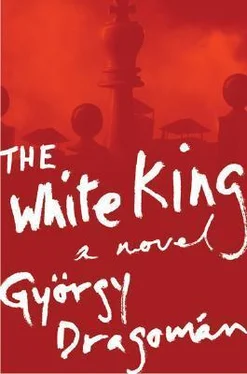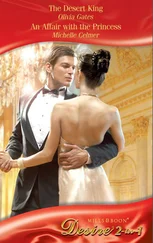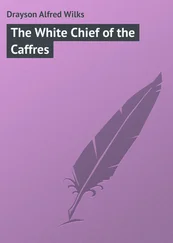Slowly I staggered to my feet and said, "Luckily nothing really bad happened, all in all I got only one kick and I banged my knee and one of the bricks got me in the ribs just a little, it was nothing, I've survived worse." But, I added, an arm of my school jacket got torn half off and my pants got scuffed up, and when Mother saw that, she'd know I'd been fighting again even though I'd promised her I would never ever fight again. Pickax replied that in today's world you shouldn't go making such promises, and he told me to take off my jacket. Only then did I notice that the laborer's jacket he had on was all covered with bird feathers, feathers sewed on next to each other and on top of each other in thick rows, so much so that the jacket was more like a strange sort of scaly armor, the plumes were mainly grayish, from sparrows and pigeons and crows, but there were also colorful songbird feathers here and there, and this surprised me so much that my hand froze as I was pulling it out of my torn school jacket, but for a moment only, before the jacket finally came off. As Pickax now took it from me without a word, the remaining change jingled in its pocket. After inspecting the tear by pulling on the sleeve and putting his hand inside and turning it half inside out and tapping the lining, Pickax pronounced that it wasn't such a big deal, it would take just five minutes to fix it up, plus of course two able hands, a little needle, and some thread. Then he gave me back the jacket and waved a hand toward the beer bottle and told me to go get it for him, because as far as he could tell, there was a little left on the bottom, which was really lucky, it would be a shame to just leave it there. Not wanting to smear my hand with Lupu's blood, I picked up the bottle carefully, by the neck. Pickax drank down the remaining beer in one gulp and flung away the bottle before wiping his hand on his pants and saying, "Let's go." I thanked him for the help but said I had to go home because I had a geography exam the next day. Pickax then grabbed my shoulders, turned me toward him, looked me in the eye, and asked if I was scared of him, and I said, "No," and meanwhile I was looking at his eyes, they were really blue, almost as blue as water. "No," I said again, "I'm not scared," and then Pickax let go of my shoulders and said he was glad to hear that because lots of folks were scared of him on account of his face, though there really wasn't any reason to be frightened because he was a very good person, and more important, he was honest through and through. Then he told me to walk back with him to his hut because he'd been wanting to show me something for a while now, and anyway, it would be best if I brushed myself off a bit before going home. He picked up the crowbar and the sledgehammer and he gave a kick at Lupu's plastic bag, which was on the ground with the brick still in it, and the bag whirled rustling through the air maybe twenty feet before plopping in the mud between clumps of grass, and then Pickax pointed the crowbar toward the old soccer field and said, "Let's go."
Pickax had built his hut in the upper end of the sewage ditch, where it went up beyond the soccer field and into the wheat field. He widened out the end of the ditch and then closed it off with cardboard and tin and plywood, and covered the top with planks, plastic bags, and tarpaper, and he must have gotten his hands on an iron stove somewhere because as we walked along I could see the stove's chimney from far away, sticking up out of the hut's roof and giving off plumes of whitish smoke. Pickax didn't say a word the whole way, he just whistled to himself and kicked at clumps of grass, and when I asked him what it was he wanted to show me, all he said was that if I waited I'd find out, and he went right back to whistling, and then I thought of all those stories the guys told about how he ate cats and dogs, injected shots of plum spirits into himself with a needle, and climbed up the balconies of the apartment blocks at night and peeped in windows to see what folks were up to, and although I hardly believed any of this, I thought I shouldn't go with him, that it would be best to run home instead, but curiosity got the better of me, I'd never heard anything about Pickax inviting anyone over, and so I kept following along behind him all the same.
As soon as we reached the ditch Pickax jumped right in without a word, even though it was around ten feet deep, and he must have noticed that I was thinking of jumping in after him because he called up to say I should climb down the steps instead, I was such a little wimp I'd break my bones, and then I looked down into the ditch and saw a bunch of rusty car fenders sticking out along the wall that you could walk on all the way down, so that's what I did. After tossing his crowbar and sledgehammer on a pile of rusty tools, Pickax picked up a tin watering can, went over to the oil barrel, lifted off the wooden board that covered it, and dipped in the can, and as he put back the cover I heard him say, "The poor things need some water, they do, they must be really thirsty by now," and then he went over to the door and opened it, and all at once I heard the singing of birds louder than I'd ever heard it before, and when I stepped in after Pickax, in no time my head was throbbing from the sudden heat and the earsplitting birdsong and the burnt smell of scalded bird feathers. Pickax told me to shut the door fast because the warm air would escape and the poor things would get cold, and that's when I saw that the walls were full of hollowed-out little nooks, some of them closed off with woven willow twigs or metal screens, and others with nothing but pantyhose or a scrap of gauzy curtain stretched over a frame. But there was something moving inside each nook, and when I stepped closer I saw that they were birds, an awful lot of them, including many I didn't recognize at all, but there were also blackbirds, buntings, and larks, and every single one was hopping about, excited and fidgety, and some flew straight at their screens over and over again when they saw me. There must have been more than three hundred birds in all, maybe even five hundred, because the walls were completely covered with screens and nets. Pickax waved a hand all around and explained, "These little ones are my wee feathered kids, but they're ungrateful, they are, they're such harebrains that despite all the love I give them, they'd still rather fly away, yes, I keep them caged so they won't go freeze in this late autumn cold, why, they'd all croak if I didn't take care of them. Just look at them," he said, "even now they're making a racket instead of singing pretty songs, but no problem, in a second they'll quiet down, just watch how quiet it'll get," and as he said this he took off his miner's helmet, which is when I noticed what light, whitish blond hair he had, and after putting the helmet on the kitchen table, which had three good legs and a fourth one of stacked bricks, he stepped to the middle of the room, raised his arms above his head, and stretched his head so far back that his Adam's apple jutted out on top, and then after shutting his eyes he let out this screech maybe six times in a row, and everything really did get quiet on account of that, the birds all hushed up at once and didn't even move, no, they just stood there behind their screens and nets as Pickax opened his eyes and gave a wink and said, "They got scared, this is the call of the golden eagle, and every bird is scared of that, even those that never heard it before, the fear is in their guts, but if we now give them something to drink, pretty soon they'll be singing beautifully for us." Picking up the watering can, he poured some water into a broken-necked glass bottle in a straw case, which he then handed to me, telling me to be careful not to give even one bird more than a little sip, too much water weighs them down so much they won't want to sing, and then he stepped over to the wall of the ditch, and with flittering movements he began pouring water for the birds. On stepping over to the wall myself, I noticed that every nook had a crooked little trough leading into it that was made of a folded tin can. Lifting the bottle, I started pouring a little water into each trough as best I could, even though the bottle was hard to hold, the straw around it was so slippery, but somehow I managed to splash only a little water the wrong way. The birds must have been scared of me because they all drew back and kept an eye on me with slightly slanted heads, motionless, from deep inside their grottoes. Pickax was going about it a lot faster, and the sound of the water as he splashed it again and again into the cans was always a little different, and that's what I was listening to when, all of a sudden, Pickax asked if I remembered the time I once called him Father.
Читать дальше












